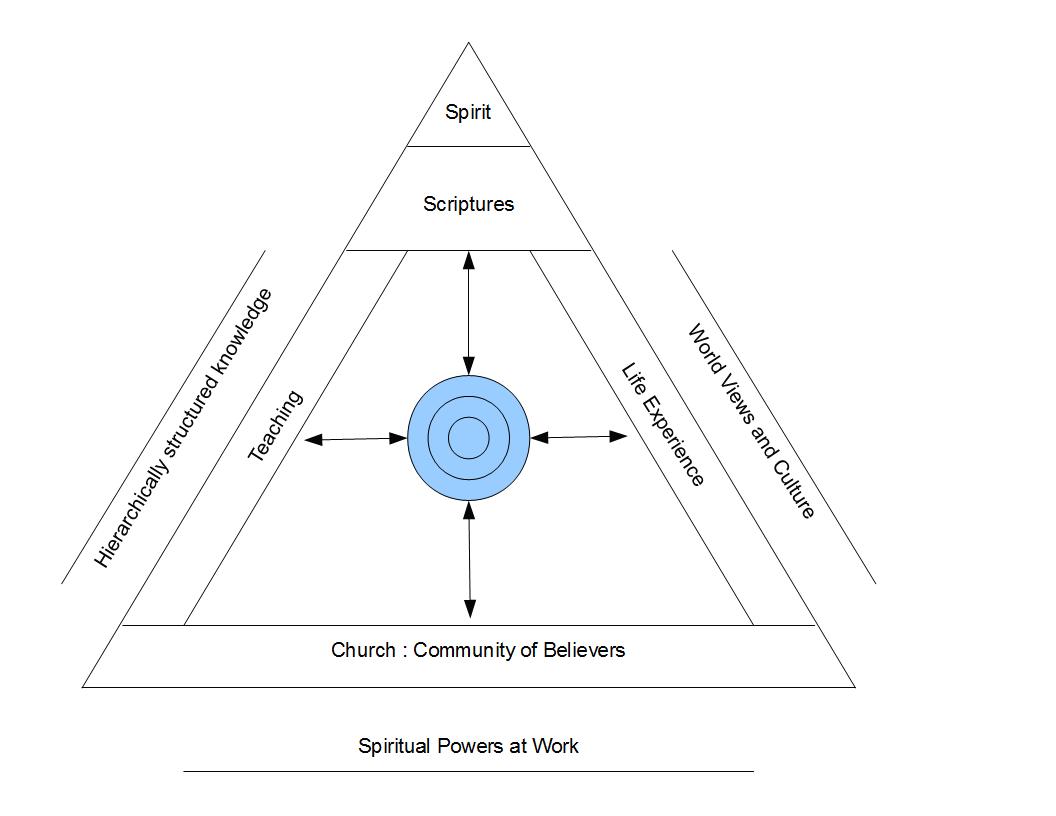The diagram below is drawn from ch. 5, Intégration Bible et spiritualité chrétienne, of my essay, Comment donc comprendre la Bible aujourd’hui ? (pdf, 139 p.). It illustrates the factors that are taken into account in the choices a person makes with regards to believing and knowing. “Scripture”, in this context, means, of course, the Bible.

The blue circle at the centre represents the human person in the complexity of his conscious, semi-conscious and unconscious dimensions. It includes that which a person keeps secret or hides, presenting herself at times in all authenticity, at times knowingly or unknowingly wearing a mask. Bidirectional arrows suggest that we also bear our imprint in each of the spheres illustrated.
Outside that blue circle, the hierarchically structured knowledge represents, for example, those sciences that are said pure or hard and those sometimes called soft, such as what can be learnt from the humanities, and the lower degree of certainty that it is thought possible to draw from the latter as opposed to the former.
World views and culture refer to ways of being and doing adopted by collectivities and based upon modes of thinking and of talking learnt from the environment we live in, where the way we express what we think by talking about it, is also the means through which are taught or shared and reinforced our modes of thinking.
These latter two spheres of hierarchically structured knowledge and world views and culture in and of themselves contribute in determining if we will be able to admit or not the presence of a third sphere of influence, that of spiritual powers at work.
As far as the triangle itself goes, it represents those elements that leave their mark on us and on which we leave ours. We reinforce, them whenever we are abounding in the direction we are invited to by the hierarchically structured knowledge that happen to be the most valued within a given time frame and within a given context. On the other hand, when we have the courage to differ from some of the commonly accepted ways of defining things, because we consider and act upon some aspects of reality that are discounted in a given context, we then assume a much-needed function of cultural counterweight.
For example, if we allow ourselves to be moved by Him who speaks from the Heavens above through the Scriptures and, through His Spirit, invites us to Him, the effect of such a choice on our part will be manifested in all of the spheres mentioned above. If on the other hand we allow, either our own experience, or our church group and its teachings, to block our access to God, to His Spirit, and to His Word, we then will be alone in this world, being deprived of the true sources of life and of knowledge.
You might also want to check out 100huntley – YouTube
or 100 Huntley Street – Life Changing Stories
from Home – 100 Huntley Street:
-
The Bible – Made in God’s Image, Dr. Craig Evans, Mar 5, 2013;
-
God’s Story of Love and Transformation, Dr. Craig Evans, Mar 8, 2013;
-
Making Sense Of Our World Through Christian Perspective (1/2),
L.T. Jeyachandran, October, 2010; -
Making Sense Of Our World Through Christian Perspective (2/2),
L.T. Jeyachandran, October, 2010; -
Religion & War, Dr. Ravi Zacharias, March 27, 2010;
-
Can There Be Meaning Without God?, Dr. William Lane Craig, April 23, 2009;
-
How Can Christianity Be The One True Religion?,
Dr. William Lane Craig, May 12, 2009; -
Historical Resurrection of Christ?, N.T. Wright, January 5, 2009.
Please do not leave this page without investing the 50 minutes or so required to listen to what James W. Sire has to say about Why Should anyone Believe anything at All ?
Listening to Biblical Culture and Modern Application, and its discussion forum, may also help think through some of the cultural issues involved in our understanding of reality. These latter two videos of about one hour each on biblical hermeneutics are from the tenth lesson of the seminary course He Gave Us Scripture: Foundations of Interpretation from Third Millennium Ministries. For a brief presentation of this course on the pages of www.savoiretcroire.ca, select Knowing and then Bible Study Material, from the menu.
In-depth studies of specific themes are provided by John Piper at Desiring God. Some of these may help friends of www.savoiretcroire.ca in getting a grasp between various sub-sections of the diagram found at the top of the present page regarding aspects of Christianity that are sometimes hard to fully comprehend and live-up to:
- Don’t Ignore the Book: Extract of 4 seminary conferences on Romans 9:1 to 10:4, showing that God’s Word never fails – God’s sovereignty presented in Romans 9-11 being foundational to the promises made by God to believers in Romans 1-8.
- You Must be Born Again: 16 sermons to help understanding what it means to know Jesus Christ in such a manner that it truly produces life eternal – This is not a matter of belonging to any given religion or religious group, nor of manifesting spiritual zeal of any sort. Instead, it requires receiving God’s gift of life through faith in Jesus Christ.
- 2015 Conference for Pastors: What does it mean to be a leader of a Christian Church? Why is it important for Church leaders to grow in the likeness of Jesus Christ, and to lead others along the same path? How does sin relate to the lives of all Christians including Church leaders? What might it be like to live eternally in our glorified state?
You wish to get involved and discuss about life-related subject matters, feel free to join our trilingual Community of dialog about the Christian Faith (French, English, Spanish).
Daniel Garneau, B Th, B Com, MA.
May 31, 2017; January 5, 2018.
Obsolete URL links updated, October 12, 2023.
